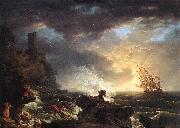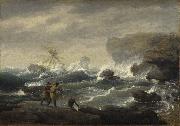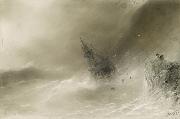Wholesale Oil Painting Reproductions No Minimum and Door to Door! |
|||||||||||
|
|
|||||||||||

|
|||||||||||
|
|
|
||||||||
All VERNET, Claude-Joseph Oil Paintings |
||||||||
|
|
||||||||
|
|
||||||||
|
Artist Introduction: French Painter, 1714-1789
Painter. Vernet probably received his first lessons in painting from his father, Antoine, who then encouraged him to move to the studio of Philippe Sauvan (1697-1792), the leading master in Avignon. Sauvan supplied altarpieces to local churches and decorative works and mythologies for grand houses in the area. After this apprenticeship Vernet worked in Aix-en-Provence with the decorative painter Jacques Viali ( fl 1681- 1745), who also painted landscapes and marine pictures. In 1731 Vernet independently produced a suite of decorative overdoors for the h?tel of the Marquise de Simiane at Aix-en-Provence; at least two of these survive (in situ) and are Vernet's earliest datable landscapes. These are early indications of his favoured type of subject, and Vernet would have studied works attributed to such 17th-century masters as Claude Lorrain, Gaspard Dughet and Salvator Rosa in private collections at Aix and Avignon. Three years later Joseph de Seytres, Marquis de Caumont, who had previously recommended Vernet to the Marquise de Simiane, offered to sponsor a trip to Italy. |
||||||||
|
|
||||||||
|
Shipwreck Painting ID:: 51092 |
1759
Oil on canvas,
96 x 134,5 cm |
|||||||
Height Width |
INS/CM Quality |
|||||||
|
X |
| |||||||
|
|
||||||||
All Thomas Birch Oil Paintings |
||||||||
|
|
||||||||
|
|
||||||||
|
Artist Introduction: 1779-1851
Thomas Birch Gallery
American painter of English birth. He was one of the most important American landscape and marine painters of the early 19th century. He moved to America in 1794 with his father William Birch (1755-1834), a painter and engraver from whom he received his artistic training. The family settled in Philadelphia, where William, armed with letters of introduction from Benjamin West to leading citizens of that city, became a drawing-master. Early in their American careers both Birches executed cityscapes, several of which were engraved. Thomas contributed a number of compositions to The City of Philadelphia in the State of Pennsylvania, North America, as it Appeared in the Year 1800 (1800), a series of views conceived by the elder Birch in obvious imitation of comparable British productions. An English sensibility is also apparent in the many paintings of country estates executed by father and son in the early 19th century (e.g. Eaglesfield, 1808; priv. col.). These compositions, along with such portrayals of important public edifices in and near Philadelphia as Fairmount Waterworks (1821; Philadelphia, PA Acad. F.A.), emphasize the cultural progress and commercial prosperity of the young United States as well as its almost Edenic natural beauty. Birch is also known for his representations of winter landscapes. |
||||||||
|
|
||||||||
|
|
Shipwreck Painting ID:: 71908 |
Date ca. 1829(1829)
Dimensions 69 x 99.2 cm
|
||||||
Height Width |
INS/CM Quality |
|||||||
|
X |
| |||||||
|
|
||||||||
All Ivan Aivazovsky Oil Paintings |
||||||||
|
|
||||||||
|
|
||||||||
|
Artist Introduction: July 29, 1817 C May 5, 1900) was a Russian painter of Armenian descent, most famous for his seascapes, which constitute more than half of his paintings.Aivazovsky was born in the town of Feodosiya, Crimea, to a poor Armenian family. His parents family name was Aivazian. Some of artist's paintings bear a signature, in Armenian letters, "Hovhannes Aivazian" (Յովհաննէս Այվազեան). His talent as an artist earned him sponsorship and entry to the Simferopol gymnasium ??1 and later the St.Petersburg Academy of Arts, from which he graduated with the gold medal. Earning awards for his early landscapes and seascapes, he went on to paint a series of portraits of Crimean coastal towns before traveling throughout Europe. In later life, his paintings of naval scenes earned him a longstanding commission from the Russian Navy.
In 1845, Aivazovsky went to Istanbul upon the invitation of Sultan Abdelmecid, a city he was to travel to eight times between 1845-1890. |
||||||||
|
|
||||||||
|
|
Shipwreck Painting ID:: 94880 |
1874
cjr |
||||||
Height Width |
INS/CM Quality |
|||||||
|
X |
| |||||||
|
|
||||||||
|
Prev Next
|
||||||||
|
|
||||||||
|
Related Paintings to Ivan Aivazovsky :. |
||||||||
|
|
||||||||
|
CONTACT US |



